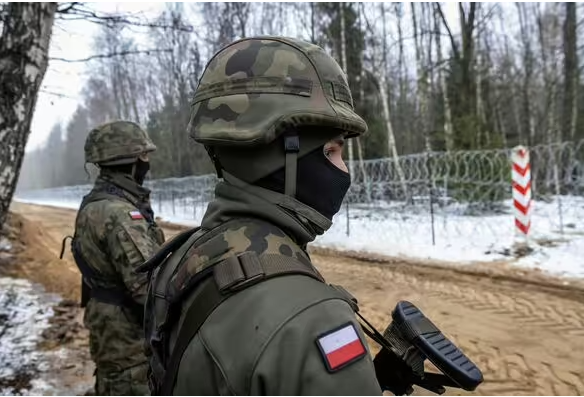Tensions between the two EU nation states have flared as both try to control migration within their borders.

Poland is under pressure from the far-right to control migration (Image: Getty)
Poland is set to deploy 5,000 troops to its border with Germany as tensions between the two continue to rise over migration. The Polish military will deploy troops to the border in a bid to prevent failed asylum seekers from returning to the country.
Soldiers will conduct vehicle searches and use surveillance equipment to detect those attempting to re-enter the country with the Polish Air Force potentially in line to participate in the operation. Troops will also be deployed to the border with Lithuania with the same mission. Donald Tusk, Poland’s prime minister, said: “We consider the temporary restoration of controls at the Polish-German border necessary to limit and reduce to a minimum the uncontrolled flows of migrants back and forth”.

Poland has rejected the chance of collaborating on joint border control (Image: Getty)
The German Interior Ministry has suggested that the two countries could enter a formal cooperation agreement on border security but this has been rejected by Warsaw.
Waldemar Kosiniak-Kamysz, the defence minister, told broadcaster TVN24: “The minister from Germany will not tell us what to do in Poland. With sympathy, with respect, but we will protect Polish borders ourselves.”
The Polish government is currently facing significant pressure from nationalist and far-right groups who claim that enough is not being done to limit the flow of migrants into the country.
Germany is also under pressure to address the issue, with German elections earlier this year seeing the far-right party Alternative for Deutschland (AfD) gain the second largest share of the vote.

Support for the far-right in Germany has ramped up pressure in the government to act (Image: Getty)
New German Chancellor Friedrich Merz has placed immigration at the top of his to do list and has introduced an end to the family reunification policies in the country as well as the so-called pushbacks.
So far, the number of refugees entering the country this year has reduced by 60%.
Mr Tusk has called on Germany to help the country control migration, given its geographic location as an external border to the European Union.
He said: “Poland’s patient position after Germany formally introduced unilateral border controls is wearing out.”
Such is the gravity of the problem amongst some of the electorate that some Polish border towns have seen the creation of vigilante groups who forcibly prevent refugees from crossing the border into the country, whilst protesters aligned with far-right groups have held demonstrations at the border.

